The nation’s largest electric utilities are pouring money into political action committees and tax-exempt political organizations that work to elect governors, attorney generals and state legislators at an unprecedented rate for the industry this election cycle. Most of the cash is being directed toward Republican candidates.
The latest filings from the tax-exempt political organizations Republican Governors Association, Republican Attorneys General Association, Republican State Leadership Committee, Democratic Governors Association, Democratic Attorneys General Association, and Democratic Legislative Campaign Committee detail the political expenditures from several investor-owned utilities along with the industry’s trade association, the Edison Electric Institute.
The ten largest utility donors to these political organizations so far this election cycle in order are:
| NextEra Energy | $1,179,696 |
| Edison Electric Institute | $618,350 |
| Southern Company | $553,588 |
| Xcel Energy | $506,879 |
| Public Service Enterprise Group | $337,500 |
| Eversource | $330,450 |
| Dominion | $306,125 |
| Duke Energy | $235,319 |
| Pinnacle West | $225,000 |
| American Electric Power | $215,000 |
The companies are predominantly focused on supporting the Republican Party. In fact, the breakdown by party for the entire industry to the tax-exempt political organizations is $4,493,738 to the Republican Governors Association, Republican Attorneys General Association, Republican State Leadership Committee, and $1,835,577 to the Democratic Governors Association, Democratic Attorneys General Association, and Democratic Legislative Campaign Committee.
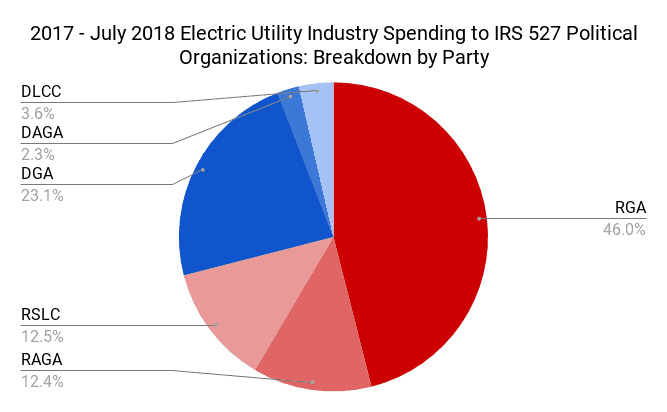
Nearly all of the top contributors have territories or assets that span several states. The exception appears to be Pinnacle West, the parent company of Arizona Public Service, which only has monopoly-granted service territory in Arizona and nearly all of its major power plants also in the state; yet, the utility is a top contributor to the political organizations.
However, the six political organizations serve many purposes for utility companies.
Last month, CBS News investigated RAGA and reported on its April 19-22, 2018 event at The Sanctuary on Kiawah Island, South Carolina. The agenda, obtained by CBS News, shows various resort activities, including yoga on the beach, golf, and a dolphin tour.
“Rubbing shoulders with a state attorney general doesn’t come cheap. To get an invite to a four-day retreat, lobbyists had to fork over $125,000 … On a hidden camera, Georgia Attorney General Chris Carr can be heard saying, ‘We can’t do what we do without your help.’”
CBS News also revealed that of 88 contributions to RAGA it reviewed, 46 of the donors had matters under consideration or had recently settled with an attorney general.
According to a 2018 membership document published by Documented, companies that contribute at least $50,000 per year can lead private issue briefings with the Republican attorneys general. Companies that contribute at least $125,000 get an additional benefit of attending exclusive dinners with the attorneys general.
The Intercept has further revealed that RAGA also has a file-sharing website called “The Briefing Room” used to share policy documents. Donors who give more than $25,000 a year have “posting access.”
Utilities have contributed to the political organizations at one of their highest ever rates this cycle. With five months of campaigning still to go, utility contributions have already surpassed the 2010 and 2012 cycles, and the industry is a few thousand dollars short of the 2016 cycle. Only the 2014 election cycle saw more political contributions, largely due to the total of $5 million in cash that Duke Energy, NextEra, and its subsidiary Florida Power & Light provided to the Republican Governors Association. The Wall Street Journal reported in December 2017 how Florida Power & Light was limited in the amount of money it could contribute directly to Rick Scott’s campaign by state laws. Instead, it funneled the money to RGA, which would pass the money to Scott’s campaign days later.
Governors play a crucial role for utility companies in their own states. In most states, governors appoint people to the agencies that regulate utilities’ business operations and legislators often have to confirm the regulators. Attorneys general, meanwhile, can play a vital role in helping utility companies advocate for their positions, particularly over EPA regulations, or during electric and gas rate cases.
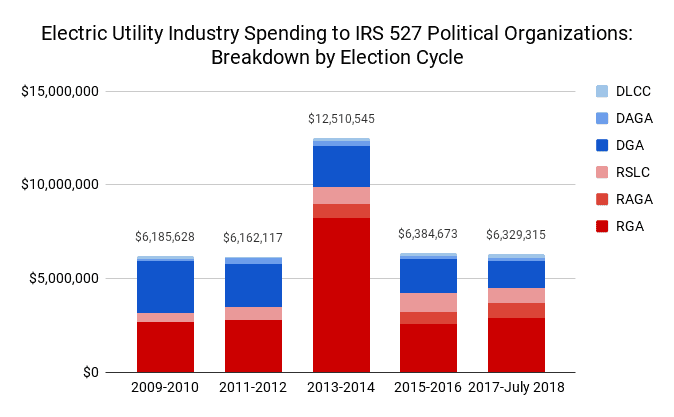
Industry contributions have increasingly been going to Republican Party organizations and decreasing for Democratic Party groups. DTE Energy, Duke Energy, FirstEnergy, NextEra, Pinnacle West, Southern Company are just a few of the utilities with at least a half a million dollars in difference in contributions between the two parties since the 2010 cycle. Only Exelon has primarily focused on contributing to Democrats.
The difference in contributions to parties, however, does not just appear with the six tax-exempt political organizations that focus on state candidates.
Industry donations to Democratic federal candidates and party committees have also steadily declined since the 2010 cycle, and have increased to Republicans, according to the Center for Responsive Politics.
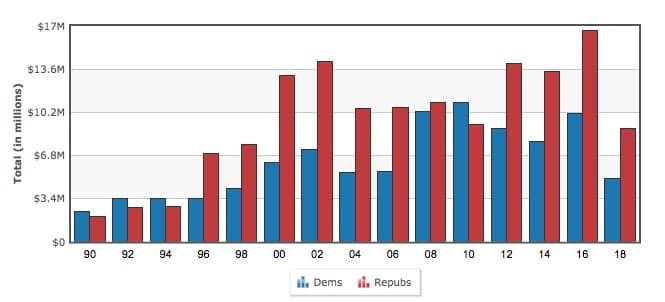
Electric Utilities: Long-Term Contribution Trends to Federal Candidates and PACs. Data as of July 16, 2018. Source: Center for Responsive Politics
The investor-owned utilities that have given the most cash to the tax-exempt political organizations like RGA and RAGA are nearly the same ones who are leading the way in spending on federal candidates and outside spending groups, according to the Center for Responsive Politics’ analysis of Federal Election Commission data released on July 16.
| Pinnacle West | $2,217,828 |
| NextEra Energy | $1,925,838 |
| Exelon | $1,022,340 |
| Southern Company | $804,353 |
| Duke Energy | $747,384 |
| Pacific Gas and Electric | $739,310 |
| FirstEnergy | $582,226 |
| Dominion | $550,117 |
| Edison Electric Institute | $536,571 |
| Entergy | $394,502 |
Those on the receiving end of utility campaign cash are PACs such as the National Republican Congressional Committee and the Senate Leadership Fund Super PAC whose “one goal” is to “protect and expand the Republican Senate Majority when Elizabeth Warren, Bernie Sanders and Chuck Schumer, together with their army of left-wing activists, try to take it back in 2018.” The NextEra PAC has contributed $1 million to the Senate Leadership Fund ($500,000 on February 27, 2018 and $500,000 on March 22, 2017).

NextEra PAC 2018 donation to Senate Leadership Fund

NextEra PAC 2017 donation to Senate Leadership Fund
The Republican National Committee has also received utility cash, including a $100,000 check from the FirstEnergy PAC on May 2, only a month after a FirstEnergy subsidiary declared bankruptcy and began a lobbying blitz to get a federal government bailout for its coal and nuclear power plants.

FirstEnergy PAC Contribution to RNC in May 2018
In addition to the industry’s spending on federal politicians and their PACs, and tax-exempt political organizations focused on state candidates, individual utilities appear to be increasing their donations to individual state candidates’ campaigns over the past election cycles, according to Energy and Policy Institute’s analysis of ten investor-owned utilities’ contributions in Florida, Michigan, and Wisconsin.
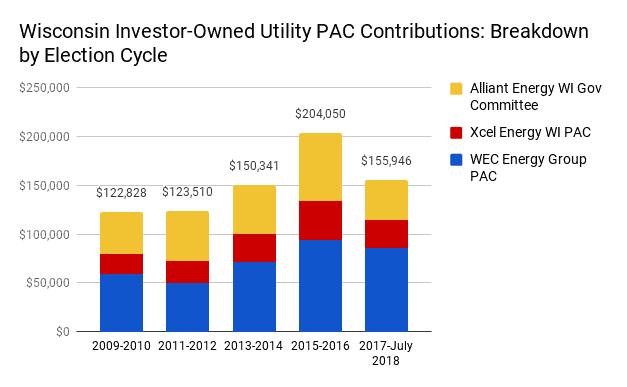
Utilities in Wisconsin have increased spending on an annual basis since the 2010 cycle. WEC Energy Group, a holding company of several gas and electric utilities in the state including We Energies and Wisconsin Public Service, recently contributed $4,000 to the State Senate Democratic Committee but also $20,521 to Governor Scott Walker for his reelection bid.

WEC Energy PAC contribution to State Senate Democratic Committee

WEC Energy PAC contribution to Scott Walker
The same trend is apparent in Michigan. Campaign finances detail that both DTE Energy and Consumers Energy have together contributed over $1,000,000 in each of the past two election cycles and could again as well this cycle. Already, the two utilities have contributed a total of $918,404 through July 20, and may pour more money into campaigns once the primary elections occur in August – which will narrow the field, particularly the gubernatorial race.
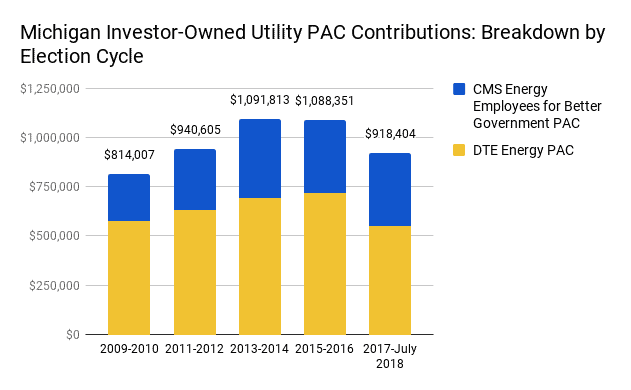
The latest contributions from the two utilities include large donations to the state’s political parties, including a $12,500 contribution from DTE Energy to the House Republican Campaign Committee on July 12. On June 12, DTE contributed less than half that amount – only $5,000 – to the Michigan House Democratic Fund.
In Florida, as of July 20, the utilities’ combined giving has also sharply increased – particularly during the 2014 election cycle that featured a gubernatorial election. The data in the chart excludes the $20 million the four utilities contributed to the Consumers For Smart Solar committee during the 2016 election cycle in a failed attempt to restrict rooftop solar installations via a ballot amendment. Florida’s primary election is August 28.
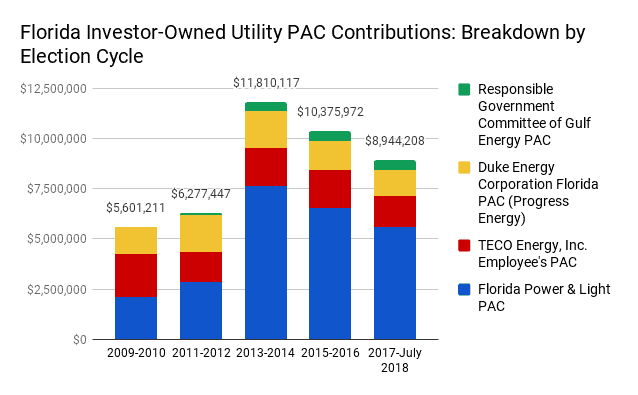
Earlier this year, EPI analyzed how the utilities in the state largely contribute money to other PACs that filter down to political firms that work to elect mostly Republican candidates. For example, Florida Grown, a PAC associated with Republican candidate for governor Adam Putnam, has received over $3 million in contributions from other PACs that receive utility cash. The utilities themselves have also donated to Florida Grown. FPL contributed $250,000 to the PAC in January 2017 and $592,160 in total since the committee was created three years ago.


[…] and federal levels, they still have a tremendous influence on the country’s political systems. A report from the Energy and Policy Institute found that in 2018, the country’s largest utilities donated millions of dollars to a variety of […]